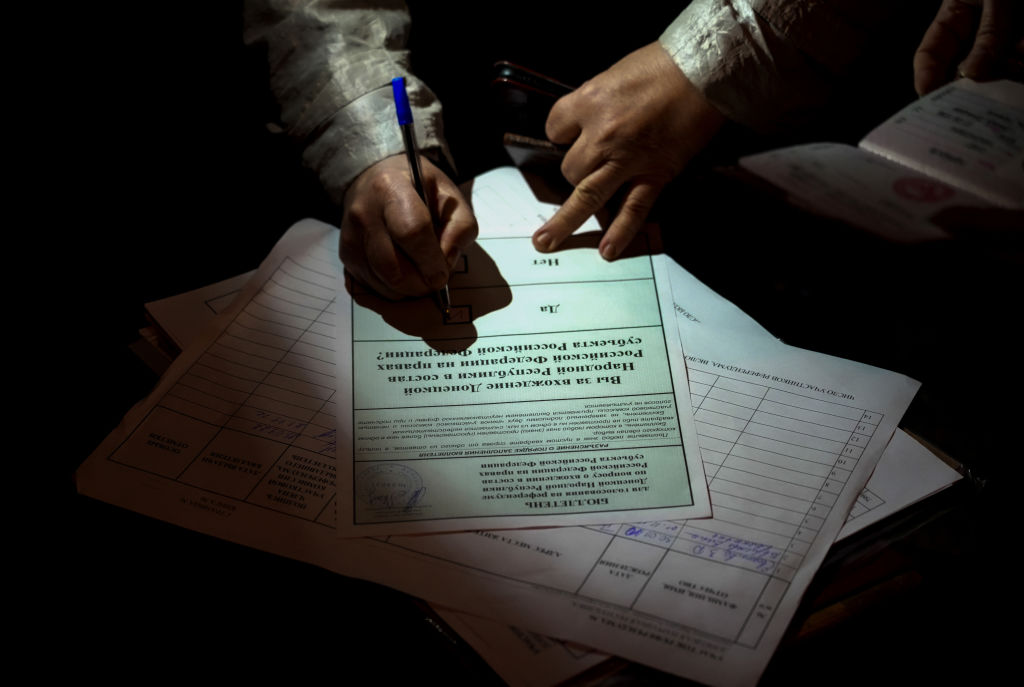
After holding a series of sham referenda across large swathes of Russian-controlled southern and eastern Ukraine, the Kremlin announced on Thursday that President Vladimir Putin will hold a signing ceremony on Friday to formally annex the Ukrainian regions of Donetsk, Luhansk, Kherson, and Zaporizhzhia into the Russian Federation. The decision amounts to a land grab of approximately 35,000 sq. mi., or about 15% of Ukrainian territory—a land mass roughly the size of Maine or Indiana.
Putin is also expected to give a major speech Friday, and will meet with appointed ministers of the four annexed regions. The U.S. and European allies, in addition to other countries, have pledged that they will not recognize the decision.
The outcome of the referenda—a misnomer, given the coercive methods used to carry them out—hardly came as a surprise. Russia has a long history of cosplaying democracy, from its 2014 referendum on the annexation of Crimea (in which 97% of voters purportedly voted to join the Russian Federation, though the actual result is thought to have been closer to 15%) to the staged elections in 1940 that paved the way for Lithuania, Latvia, and Estonia to join the Soviet Union that year. Then, as now, the votes represented farcical facsimiles of democracy that were designed to obfuscate rather than convince. “The purpose of it is essentially to sow doubt,” says Roger Moorhouse, a British historian specializing in German and Central European history, “and to give Russia’s supporters, both abroad and at home, something to defend, even to themselves.”
For Putin, there are tactical benefits to annexing Ukrainian territory now. Having failed after seven months to achieve his maximalist ambition—which at the war’s onset was to take Kyiv and remove the government led by President Volodymyr Zelensky within a matter of days—the Russian leader is now being forced to shore up his minimalist ambitions. These entail cementing his control over the eastern Donetsk and Luhansk regions—controlled by Russian-backed separatists since 2014, and which Moscow recognized as independent in the days leading up to February’s full-scale invasion of Ukraine—as well as the other regions under Russian military control. “What we’re seeing is an attempt to freeze the front line at this point,” says Moorhouse, noting that doing so before winter sets in could allow Putin to reorganize and revitalize his war efforts in preparation for spring. Moscow has already sought to replenish its diminished forces by announcing a “partial mobilization” of Russian citizens. The move prompted an immediate backlash among ordinary Russians, thousands of whom have been arrested in protests. Many potential conscripts are now trying to flee the country in an effort to dodge the draft.
And perhaps with good reason. Moscow has little to show for what it calls its “special military operation” in Ukraine. The Ukrainian army’s dramatic counteroffensive in early September in the country’s north- and south-east, which saw Kyiv wrest dozens of towns and cities back from Moscow’s control as Russian soldiers fled in retreat, was a major recent setback. That the Russian government is now attempting to conscript men with little to no military experience also doesn’t bode well. In the absence of military victories, the Russian President appears to be resorting to territorial gains via sham electoral contests instead.
Read More: Inside the Ukrainian Counterstrike That Turned the Tide of the War
Conscripting potentially hundreds of thousands of Russian soldiers into a war that was only ever supposed to last for a couple of weeks was always going to be a hard sell for Putin, even in a country as seemingly pliant as Russia, where vocally opposing the war (let alone calling it a war) is a risk. But by annexing Ukrainian territory, Putin is giving himself further justification for the mobilization—one that not only supports the continued invasion of Ukraine, but also defends Russia’s newly acquired sovereign territory. Putin may also hope that the move will boost support for the war both domestically and among Russia’s limited international allies, such as China and India, both of which have expressed waning patience with the protracted invasion.
But perhaps the most significant reason that Putin is annexing Ukrainian territory now is to try and undermine Western support for Ukraine. Although the U.S., Britain, and others remain resolute in their political, financial, and crucially, military support for Kyiv, other Western countries such as Germany and France are wary of any potential escalation—particularly those that could prompt Putin to act on his previous nuclear threats or further disrupt energy supplies and markets. Even if the West doesn’t recognize the legitimacy of Moscow’s unilateral annexation, the fact that the Kremlin now regards these territories as a part of Russia could be enough for some governments to think twice before supporting any military action that strays into those areas. “This raises the stakes and Putin knows that,” says Moorhouse. “It’s an exercise in intimidating the Western alliance, to test its mettle.”
In raising the stakes, however, Putin is also exposing the limits of Russia’s military prowess. Rapid mobilizations and rushed annexations are not the actions of a country, or a leader, that is in a position of strength. By annexing parts of Ukraine, and expanding the territories that Russia sees itself as obliged to defend, Putin is gambling that the world will see him as a leader with nothing to lose—and therefore not to be messed with. The risk is that he’ll instead be seen as someone who has already lost.
More Must-Reads From TIME
- The 100 Most Influential People of 2024
- The Revolution of Yulia Navalnaya
- 6 Compliments That Land Every Time
- What's the Deal With the Bitcoin Halving?
- If You're Dating Right Now , You're Brave: Column
- The AI That Could Heal a Divided Internet
- Fallout Is a Brilliant Model for the Future of Video Game Adaptations
- Want Weekly Recs on What to Watch, Read, and More? Sign Up for Worth Your Time
Write to Yasmeen Serhan at yasmeen.serhan@time.com